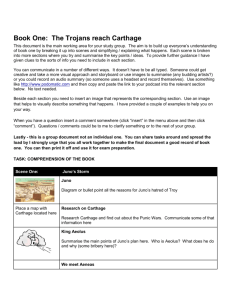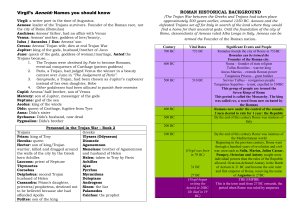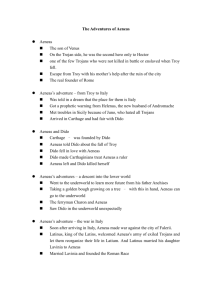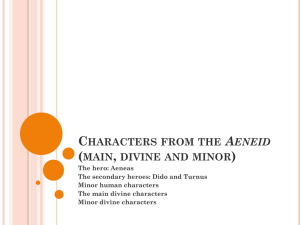Aeneid, Book I
advertisement
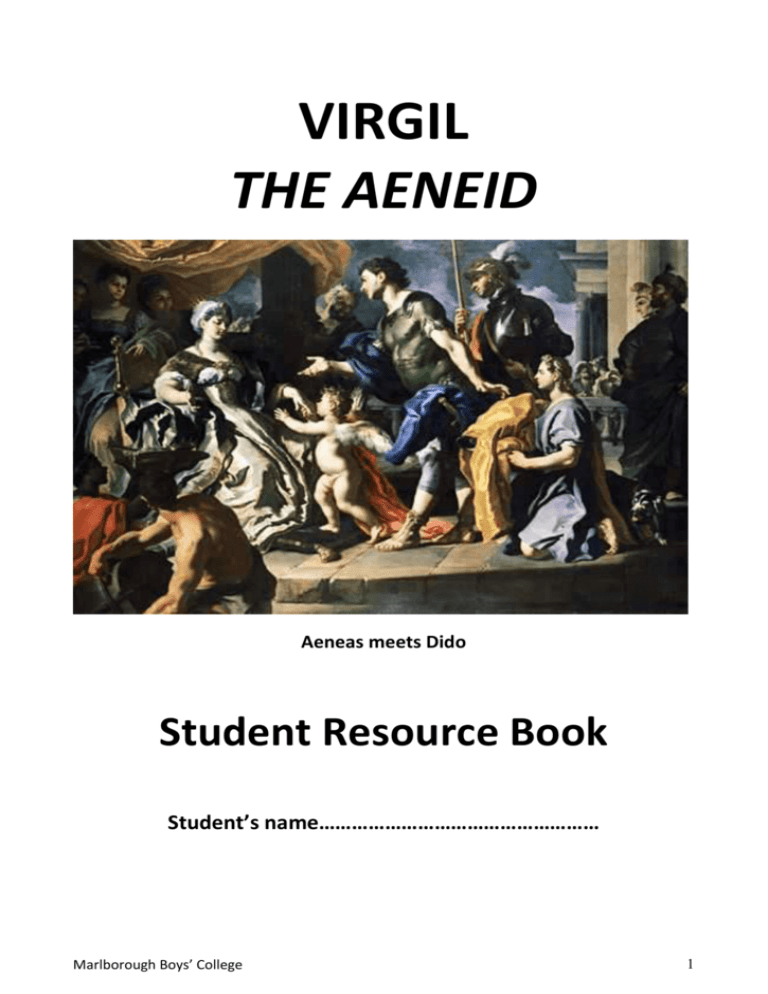
VIRGIL THE AENEID Aeneas meets Dido Student Resource Book Student’s name…………………………………………… Marlborough Boys’ College 1 THE BLOOD LINE OF AENEAS Atlas had a daughter named Electra who had an affair with Jupiter. ↓ This love produced two sons. One son named Dardanus, travelled from Italy, and founded the city of Dardania in Asia Minor. ↓ Once there, he married the daughter of a near by king, Teucer, and had a child, Erichthonius. Erichthonius in turn had a child, Tros (Troy), who had three sons of his own, Ganymede, Assaracus, and Ilus (Ilium). ↓ Assaracus had a child, Capys, who in turn had a child named Anchises. Ilus meanwhile had a child named Laomedon, who in turn had a child of his own named Priam. Thus Anchises and Priam were second cousins, and so their children were third cousins. ↓ These two third cousins, Aeneas and Hector, played significant roles in the Iliad. Hector faced Achilles out side the walls of Troy (Ilium) and died in his effort. ↓ Aeneas also faced Achilles, but he survived and went on to found Rome. HOW TO APPROACH QUESTIONS RELATING TO LITERARY TECHNIQUES: For example: Book I Page 36 1. “Then shall our furious centuries lay down their warring arms, and shall grow kind”. Personification: “Then shall our furious centuries lay down their warring arms, and shall grow kind”. The centuries are personified and portrayed as aggressive eg “furious”. Also portrayed as warriors eg the reference to “warring arms” that will change their ways and become peaceful eg “shall grow kind”. 2. “And safe within them will stay the godless and ghastly Lust of Blood” Personification: “Lust of Blood” is personified. Virgil refers to him as “godless” and “ghastly”. Also determined to continue fighting eg “still roaring from gory mouth” but prevented from doing so because he is chained up eg “but held fast by a hundred chains of bronze”. 3. “Godless and ghastly Lust of Blood”. Alliteration: Repetition / recurrence of the sound made by the letter g - used here for effect to emphasise that the personified Lust of Blood is irreverent eg “godless” and dreadful eg “ghastly”. 4. “Propped up on his pitiless piled armoury”. Alliteration: Repetition / recurrence of the sound made by the letter p - draws attention to the personified Lust of Blood and suggests that he gets his strength from weapons eg “propped up on his piled armoury” and that he destroys carelessly eg “pitiless”. Marlborough Boys’ College 2 THE AENEID - SUMMARY OF EACH BOOK Book I The Trojans Land near Carthage Virgil opens with an appeal to the muse of poetry. Aeneas is a Trojan leader, son of Venus and the mortal Anchises. He suffers as did the other Trojans from the wrath of Juno, after the judgment of Paris favoured Venus. The book begins with the Trojan fleet sailing from Sicily and now near Carthage, 7 years after the fall of Troy. Juno bribes Aeolus to unleash storm winds on them, and they founder near Carthage. Venus appeals to Jupiter for their salvation and he reassures her of their glorious future and a golden age to come (the first of many prophecies and futurity scenes). Venus appears to Aeneas disguised as a Carthaginian huntress, tells him of Queen Dido and the settlers from Tyre who have formed the colony at Carthage, surrounded by potentially hostile peoples. A scouting party led by the visible Ilioneus observes the temple under construction (Aeneas is hidden by a shield of invisibility provided by Venus). Dido reassures and hospitably welcomes them and Aeneas eventually appears. Venus arranges for her son Cupid, in the form of Aeneas' son Ascanius, to cause Aeneas and Dido to fall in love, to ensure his safety. Dido puts on a feast and her passion rises. Book II Recounting the Fall of Troy At Dido's request, A. recounts the fall of Troy. The Trojan Horse. A "captured" Greek Sinon deludes them about the reason why the horse was constructed to appease Minerva [Athena] after their attack on her temple. Laocoön, a priest who spears the horse, is attacked by two serpents, along with his sons. The Trojans break down their wall to get the horse inside. At night, the Greeks sail back to the shore and Sinon releases the men in the horse. A vision of Hector appears to A. telling him to flee the ensuing destruction and found a new city. The palace is attacked, Priam slain by Pyrrhus (Achilles' son). A. considers killing Helen but Venus deters him. A divine portent appears over the head of Iulus (Ascanius), Aeneas' son. Anchises refuses to flee at first but is persuaded, and A. carries him on his shoulders. His wife Creusus becomes separated and dies--her spirit comes to him and prophesies his great future. Book III The Wanderings of Aeneas After sailing from Troy, they sailed north to Thrace and founded Aeneadae. But the ghost of Polydorus warns them to leave. After consulting with the Delian oracle, Anchises misinterprets the advice to seek the land that first bore the Trojan race. They sail to Crete, again try to found a settlement, but a pestilence ensues. A. dreams that Hesperia (the land of the west, or Italy) is their ultimate goal, and they sail west. They encounter the Harpies led by Celeano at the Strophades, west of Greece. After they kill her cattle, they attack the Trojans. Celeano prophesies his future. They sail on to Leucas in W. Greece and stay a year. At Buthrotum in Chaonia (now part of Epirus), they are welcomed by the former Trojan Helenus, who was enslaved by the Greeks but has been freed and made a king, married to Andromache. Helenus prophesies the Italian future and the route to take, including going to the Sibyl at Cumae. A. departs and sails across the Ionian sea to the boot of Italy and on to Sicily. They encounter the stranded Greek, Achaimenides, who tells them his story about the Cyclops. They all have to flee Polyphemus when he appears, and end up at Drepanum on the west coast of Sicily where Anchises dies. Book IV Dido and Aeneas Though bound by a vow to her husband Sychaeus (killed by his brother Pygmalion), Dido has a rising passion for Aeneas, which her sister Anna encourages. Juno gets Venus to agree to the union, and arranges a hunt and a storm to bring them together in a cave. After their tryst, rumours fly through Carthage. Her former suitor, King Iarbus is jealous. Jupiter sends Mercury to chastise Aeneas and to remind him of his destiny, which does not lie with Dido. Dido rebukes A., but A. explains to her his duty without emotion, as prompted by Jupiter, and denies that they were in fact married. Dido is angered at him and swears vengeance. She tries to get Anna to delay their departure, then received bad omens and realizes she is doomed. Mercury warns A. to flee and they hastily depart in their ships. Dido orders an attack on them and curses them, pledging eternal war with the Carthaginians. She ascends to the pyre and kills herself with a sword. Marlborough Boys’ College 3 Book V The Funeral Games for Anchises As they sail back to Eryx in Sicily, they see the flames in the distance. King Acestes receives them hospitably. He and Aeneas decide to hold funeral games, in the manner of book XXIII of the Iliad, to honour Anchises who died one year ago. They have a race of ships (won by Cloanthus), foot races (Euryalus), boxing (won by Entellus), archery, and equestrian manoeuvres. Iris, disguised as the old Trojan woman Beroe, is sent by Juno to stir up trouble--she incites the women to set many of the ships on fire. Jupiter douses the fires. Nautes advises them to divide the group up, leaving the old and weary to found the settlement of Acesta near Eryx there on Sicily. The image of Anchises appears to A., asking to come to him in the underworld. Venus appeals to Neptune and is reassured that only one man will die as they sail to Italy. The helmsman Palinurus is put to sleep by the god of sleep and falls in to the water--an example of "double determination" where a person's actions are influenced by the gods as well as his own will. Book VI The Lower World The ships land at Cumae on the west coast of Italy. A. seeks the Cumaean Sibyl (prophetess) at Apollo's temple, which was founded by Daedalus. The sibyl prophesies war and the trials ahead. A. asks her help in visiting his father. She him to bring a golden bough for Proserpina in order to gain admittance. He learns also that one of his men newly deceased, Misenus, must be buried. They proceed with the cremation. A. prepares to enter the cavern, by the lake Avernus, leading to the underworld. Hecate nears, but Sibyl warns her away. They pass many personified evils and monsters: Briareus, Chimaera, Scyllas, etc. He encounters Palinurus, who cannot yet cross the Styx into the underworld because his body was not buried. Charon is appeased by the golden bough and they sedate Cerberus. They pass the infants, the Fields of Mourning. He encounters Dido, and offers her more excuses--she turns away from him to her husband Sychaeus. They also encounter Trojans and also Greeks, including Deiophobus, the 3rd husband of Helen. We learn how Helen betrayed Troy. Tartarus, on the road to the left, is described, a place of suffering and punishment for those found guilty by the judge Rhadamanthus for a variety of enumerated punishable sins. Instead, they turn right. A. places the bough at the threshold of Proserpine, and finally enters Elysium. There, he encounters Anchises. There are spirits there awaiting reincarnation after drinking of Lethe to induce forgetfulness. Anchises predicts the future: the Alban kings, other kings, Romulus, Iulus, Numa, etc. Anchises says that Rome's fame will be for its leadership and contribution to government rather than for its artistic contributions. He ends with a panegyric to Augustus' deceased son, Marcellus. Aeneas re-emerges to the world of the living. Book VII Italy and the Outbreak of War Aeneas and his men sail pass Circe's island and land near the Tiber's mouth in Latium. The Laurentians (or Latians, Latins) are ruled by King Latinus. The spirit of Faunus tells Latinus that his daughter Lavinia should marry a foreigner. More omens. The Trojans come to see the king, who treats them generously and offers A. his daughter in marriage. Juno is angered by this tranquil scene and sends the Fury Allecto to stir up discord and war. In a remarkably poetic description, she infects Queen Amata with resentment at her husband’s decision. Amata hides Lavinia and goes into a frenzied rage. Allecto also stirs up the Rutulians, in particular Turnus their king, who has been the chief suitor of Lavinia. Turnus seems to plan to march on both the Trojans and the Laurentines. Allecto also causes Iulus (Ascanius), A.'s son, to wound a deer or stag kept as a royal pet by Tyrrhus--this is the precipitating event and war breaks out. Allecto gloats and Latinus is powerless to stop the preparations. The people arm for war and the gates of war are thrown open by Juno after Latinus refuses. Book VIII Aeneas at the Site of Rome Confusion reigns. Tiber the river-god appears to A. in a dream and encourages Aeneas. A. prays to Tiber, who assists his ships upstream, and advises him to ally with Evander, son of Mercury. He is the leader of Arcadians living on the site of current Rome. He sees the white sow that had been prophesied, and encounters Evander's beloved son Pallas. Evander agrees to ally. They tour the landmarks of the future Rome. Venus appeals to her husband Vulcan to make armour for Aeneas. Venus delivers the armour to A. and tells him to not fear war. His shield is decorated with depictions of future Roman triumphs. Evander nobly and unselfishly turns his beloved son Pallas over to Aeneas to become a warrior, along with many of his warriors and horsemen. Evander recalls his heroic past, then prays for his son. Marlborough Boys’ College 4 Book IX Attack on the Trojan Camp in the Absence of Aeneas With Aeneas still away with Evander, Juno sends Iris to mobilize his enemy, Turnus to action. The enemy marches on the Trojan camp, which is alongside the river. The Trojans stay behind their walls as Aeneas had instructed them. After they do not respond to Turnus' challenge, he tries to set their ships afire. Jupiter intervenes and the ships are turned into sea nymphs, leaving the Trojans no alternative but to stay on the land and fight. Turnus goads on the Rutulians, and the fort is surrounded (except the side open to the river). Nisus and Euryalus, close friends, heroically resolve to try to get word to Aeneas at Pallanteum of the siege. Their companions know how risky this is and praise their bravery. They set out at night and begin killing many of the Rutulians lying in their way. The Rutulians charge the fort and major fighting breaks out. Iulus takes up his bow and kills young Remulus/Numanus with an arrow, his first taste of combat. Apollo blesses Iulus, and asks him to desist from further killing for the time being. The Rutulians rush in and kill many Trojans. Book X Aeneas at War With the Trojan camp under siege, the gods debate the conflict. Venus appeals to Jupiter to at least spare Iulus, to which Juno angrily counters. Jupiter responds that he will be neutral and that the fates will determine the outcome. Aeneas sails back The sea-nymphs (recently transformed from their ships) alert Aeneas to the siege and help them to be quickly transported to the site, dumbfounding Turnus and his men. A. invokes Cybele to bless their undertaking. They land and are immediately attacked by the Rutulians. A. goes on a rampage of killing and shows no mercy. Juno appeals to Jupiter to intervene and spare Turnus. She then disguises herself as Aeneas and lures Turnus aboard a ship in pursuit of him-the ship promptly sails away, temporarily saving Turnus. Book XI The Despair of the Latins The battle pauses for funeral rites for the numerous victims. A. mourns the death of his friend Pallas. The Latins petition for a peace to bury the dead. A. wonders how destiny has brought about this unexpected war. More fighting follows. Book XII The Final Combat Turnus meets with Latinus, and indicates he expects Lavinia's hand if he wins. Latinus advises him his request cannot be granted because she is destined to marry a foreigner, and asks him to relent and break off the combat, sparing them all further needless deaths. But Queen Amata is adamant that she will not accept Aeneas as her son-in-law. Turnus issues a challenge to Aeneas for single combat, the victor to receive Lavinia's hand. At dawn, the Latins and Trojans gather on the plain outside the city [?Laurentum]. Juno plots with Turnus' sister Juturna, now a sea-nymph, to save him. Aeneas prays and makes a pledge that his victory will lead to peaceful coexistence and equality and that if he is defeated, the Trojan's will depart. Aeneas tries to stop the fighting, is wounded by an arrow, and is hastily taken away. Iapyx, a healer favoured by Apollo, tries to heal A. and is surprised to find himself successful, thanks to herbs Venus adds unseen to the balm. A. speaks with Iulus, then rushes into battle. Queen Amata has lost her mind and hangs herself. Turnus confronts his disguised sister and spurns her aid, preferring a heroic death. He jumps from his chariot and calls to his men to allow him to seek single combat with Aeneas, which Aeneas accepts--the two armies draw back. The combatants are both larger than life. They fight, Turnus' sword breaks against Aeneas' armour, Juturna provides a replacement. Juno and Jupiter conference--he asks that she cease her meddling with the destined outcome, and at last she relents. She asks only that "Troy" be forgotten, the Latin customs remain, and that the language of the conquered and commingled peoples shall remain Latin. Turnus tries to throw a large boulder at A. but his strength is flagging, he has no escape, and A. finally spears him in his thigh. Turnus concedes defeat and asks that his body be given a proper burial, even that his life be spared. But Aeneas sees Pallas' sword belt around Turnus and in a final rage exacts his vengeance, slaying Turnus with his sword. Marlborough Boys’ College 5 WORK SHEETS ON BOOK ONE THE CHARACTER OF AENEAS IN BOOK I Provide one or more examples for each characteristic. Give a page reference for each example. AENEAS’ CHARACTER EVIDENCE FROM BOOK I He displays Homeric characteristics when he wishes he had died a glorious death. He displays human emotions. He displays excellent leadership qualities / he is a man of pietas: a) Puts personal feelings aside for the good of his people (ideal Roman leader) / self-sacrificing: b) Provides for his people: c) Encourages / inspires his people: d) Cares for their safety: He is charming Marlborough Boys’ College 6 THE CHARACTER OF DIDO IN BOOK I 1. Describe the physical appearance of Dido. 2. How is Dido portrayed in Book I? DIDO’S CHARACTER BEFORE SHE FALLS IN LOVE WITH AENEAS EVIDENCE (Page?) She is happy She is authoritative She is wise / sensible She is fair She is kind / generous 3. Quote words, which show that she is infatuated with Aeneas. Source each quote. a) b) 4. Provide evidence to show that Virgil disapproves of her love for Aeneas. Source? a) b) c) Marlborough Boys’ College 7 THE GODS IN BOOK I / JUNO 1. Why was Juno so hostile to Aeneas/the Trojans? 2. Provide evidence of Juno’s hostility. Give a quote (page?). 3. What is Juno’s role in the Aeneid? Evidence? THE CHARACTER OF JUNO CHARACTERISTIC In a state of furor / bad tempered/angry EVIDENCE Competitive Nasty Marlborough Boys’ College 8 VENUS 1. How is Venus related to Jupiter? Provide evidence to show that she uses this relationship to her advantage. 2. How is Venus related to Aeneas? Provide evidence to show how she helps Aeneas. 3. What is Venus’ role in the Aeneid? Evidence? 4. In what ways are Venus and Juno similar? 5. In what ways are Venus and Juno different? Marlborough Boys’ College 9 POLITICAL MESSAGES IN THE PROPHECY POLITICAL MESSAGES EVIDENCE (Page) Romans are descended from Troy The gods endorse the power of Rome / Rome’s destiny Rome is destined to be the greatest empire Rome will avenge the fall of Troy by conquering the Greek states Messages about Augustus: a) He is descended from Aeneas b) He will extend the empire to the ends of the earth c) He will be deified d) He will bring peace to Rome e) he will bring prosperity to Rome Marlborough Boys’ College 10 IMAGERY IN BOOK I Virgil frequently uses imagery (the use of symbols to describe actual events) in The Aeneid. For each of the examples of imagery listed below, explain what event the image represents. Image Pg No 1. A man calming a riotous crowd. 31-32 2. Swans pursued by an eagle. 39 3. Bees hard at work 40 4.The shooting of stags. 5. “Invisible Fire” Marlborough Boys’ College the Explain the Meaning 43 47-49 11 EXAM PRACTICE QUESTIONS book one EXTRACT ONE “In a moment the clouds had wrested from Trojan eyes the sky and the light of day: a blackness as of night fell on the ocean. The thunder cracked in heaven’s height, and in the air above a continuous lightning flared; wherever the Trojans looked, immediate death stared them in the eyes. Instantly Aeneas felt his limbs give way in a chill of terror, and groaned. Stretching both hands palm upward, to the stars, he cried aloud: “how fortunate were you, thrice fortunate and more, whose luck it was to die under the high walls of Troy before your parents’ eyes! Ah, Diomede, most valiant of Greeks, why did your arm not strike me down and give my spirit freedom in death on the battlefields of Ilium, where lie the mighty Sarpedon, and Hektor the man slayer, pierced by Achilles lance and where Simois rolls down submerged beneath his stream those countless shields and helms and all those valiant dead!” (Aeneid, Book I) In the above extract Aeneas and his Trojan companions are caught in a storm at sea. Analyse in detail and with supporting evidence: The reasons why Juno causes the storm and the outcome of this storm for Aeneas and his men. The characterisation of Aeneas as he is portrayed in this extract and other parts of Book One. Pentheseilea Pyxis showing the judgement of Paris Marlborough Boys’ College 12 WORK SHEETS ON BOOK two THE CHARACTER OF AENEAS IN BOOK II AENEAS’ CHARACTER EVIDENCE FROM BOOK II He displays Homeric characteristics. For example: “death in battle is glorious” revengeful courageous He is blinded by his fury / he displays blind anger (give at least 2 examples) Puts personal feelings aside / behaves with pietas. a) Give TWO examples from Book II, which show that Aeneas is backward looking. 1. 2. b) Provide TWO examples from Book II, which show that Aeneas has no real understanding of his destiny / mission. 1. 2. c) Give TWO examples when Aeneas displays qualities indicative of the ideal Roman hero? 1. 2. Marlborough Boys’ College 13 AENEAS’ DESTINY Aeneas receives two explicit messages about his future, from Hector and Creusa. Complete the chart below and provide evidence/quotes where possible: MESSAGE ABOUT THE FUTURE INFORMATION GIVEN/ EVIDENCE Hector tells Aeneas to….. Hector predicts something about Rome… Creusa makes a promise to Aeneas…. Creusa predicts something about Rome… Aeneas does not obey Hector at once because….. WHY DOES AENEAS FINALLY LEAVE TROY? Aeneas sees the situation as hopeless after the death of Priam. However he is not easily convinced that he should leave Troy and makes some unforgivable mistakes before he goes: 1. What horrible act does Venus prevent Aeneas from doing and why? 2. What finally forces Aeneas to leave? 3. Aeneas is so concerned about his own father, Anchises, he does no think how callous he was when he told Creusa of the death of her own father. Why do you think Virgil ignores the fact that Priam is Creusa’s father? Marlborough Boys’ College 14 4. Why does Creusa have to die? 5. What do the deaths of Creusa and many other people represent to Virgil? THE TROJANS AND THE HORSE WHO IS RESPONSIBLE FOR TROY’S DOWNFALL? Complete the chart below: Provide quotes where possible to back up your answer. SINON’S STORY AND THE TROJAN HORSE ANSWERS/ EVIDENCE How does Sinon explain his presence here in Troy? According to Sinon, who came up with the idea of erecting a wooden horse? What explanation does Sinon give for erecting the horse? What does Sinon say to convince the Trojans to take the horse inside the city walls? Whose advice was ignored as the horse was dragged into the city? Why did he speak against it? How strongly does he feel about it and why? How are the Gods / the Trojan’s responsible for the fall of Troy? Marlborough Boys’ College 15 THE INCIDENT WITH LAOCOON 1. Who was Laocoon? 2. What did he think of the horse? 3. What did he do to the horse? 4. What advice did he give the Trojans about the horse? 5. Where did the snakes come from? What’s the significance of this? 6. Where did the snakes retreat? What is the significance of this? 7. What did the Trojans think of this incident? 8. To sum up: Why did the gods kill Laocoon and his sons? To sum up: What does this incident tell us about? The role of the gods in the fall of Troy? The theme of deception? The theme of destiny? Marlborough Boys’ College 16 HOW DOES VIRGIL PORTRAY THE GREEKS? Virgil wins sympathy for the Trojans because they are the losers but he also increases this sympathy by making the Greeks very brutal. Find examples from Book II which emphasise this. Use the following as guides: GREEK PORTRAYAL EVIDENCE Cunning Deceiptful Brutal Disrespectful of other cultures/religions Courageous Pyrrhus kills Priam Marlborough Boys’ College 17 IMAGERY IN BOOK II Virgil uses imagery in Book II to match the violence of war. He uses techniques such as simile, metaphor, personification, alliteration, symbolism etc Match the items in list A with those in list B LIST A - Event LIST B - What it symbolises CORRECT Giant sea snakes devouring Laocoon and his sons Flood flattening smiling crops A The fall of Troy. The city cannot survive 1= without a leader. B 3 Priam left headless on the beach C 4 Farmers hacking at an ancient rowan tree which is uprooted and destroyed and trails havoc down the mountain side Helpless shepherd standing high on a crag of rock Creusa’s death D The morning star rising above Mount Ida bringing the day. G Aeneas (= shepherd) standing on his rooftop looking helplessly at the burning city. Flood represents the Greek army rushing into the city and destroying (= flattening) Troy. Smiling crops = happy Trojans who think the Greeks have left and therefore have been drinking and partying all night. Sea snakes came from the sea therefore they were sent by Neptune. They retreated in the temple of Minerva therefore Minerva protected them. This event symbolises the part played by the gods in the fall of Troy and relates to the theme of deception and destruction. Symbolises that Aeneas must leave his past (Creusa belongs to his past) behind and go on to fulfil his destiny. Symbolises a new beginning. Aeneas and the Trojans are destined to gather at Mount Ida. From here they will escape and go on to found the western land. Farmers represent Greeks who have attacked Troy (= hacking at it, uprooting and destroying it). Ancient rowan tree symbolises the old and famous city of Troy. When Troy is destroyed neighbouring states will also suffer (= trails havoc down the mountainside). 1 2 5 6 7 Marlborough Boys’ College E F 2= 3= 4= 5= 6= 7= 18 IMAGERY IN BOOK II For each of the examples of imagery listed below, explain what event the image represents. Image Pg No 1. A flash flood destroying crops. 60 2. A man who has stepped on a snake. 62 3. A great tree that is finally toppled. 69 4. A river breaking its banks. 66 5. A snake waking from hibernation. 65 6. A wounded sacrificial bull. 58 7. Hungry wolves searching for prey. 61 8. Wild winds of a hurricane 63 Marlborough Boys’ College Explain the Meaning 19 Exam Practice Question Book Two EXTRACT ONE ‘These tears gained him his life, and we even began to feel sorry for him. Priam set the example, giving orders for him to be relieved of the taut ropes and handcuffs. He spoke kindly to him: “Well, whoever you are, there are no Greeks here; forget them quickly and become one of us. Now answer my questions, truthfully and thoroughly. What was their purpose in erecting this massive structure in the shape of a giant horse? Who suggested it and what is it for? What is supposed to be its use either in ritual or as an engine of war?” (Aeneid, Book II) QUESTION ONE In this extract, Aeneas explains how the Greeks tricked the Trojans into defeat. Analyse in detail and with supporting evidence: the ways in which Sinon and the other Greeks contributed in the fall of Troy. The ways in which the Greeks are portrayed in Book II of the Aeneid and why they are portrayed in this manner by Virgil. QUESTION TWO Analyse in detail and with supporting evidence: The ways in which the gods brought about the fall of Troy and why? How Virgil wants the reader to view the fall of Troy and reasons why. Marlborough Boys’ College 20 WORK SHEETS ON BOOK four SYMBOLIC REFERENCE WHO / WHAT DO THESE REFERENCES RELATE TO? WHAT DO THEY SYMBOLISE? AT WHAT STAGE IN THE POEM DO THEY OCCUR? “maddening poison”, ‘cancerlike’ disease A Bacchanal “uplifted to a frenzy”, “furious”, “she ran in an excited riot” Comparison to the goddess of hunting, Diana. She is like an innocent animal (a doe) “caught off guard and pierced by an arrow”. The storm caused by Juno just before the hunting scene The departing Trojans as ants Marlborough Boys’ College 21 pillaging “Aeneas stood firm like an oak tree” Dido’s offerings to the gods The funeral pyre Marlborough Boys’ College 22 Practice Question Book Four EXTRACT TWO Now no sooner had Saturn’s daughter, Jupiter’s dear wife, 1 seen that Dido was in the firm grip of her affliction and that no thought of her reputation any longer resisted her passion, than she approached Venus with a suggestion: ‘Well, you and that boy of yours certainly have fine fruits of victory to show, 5 and great is the glory which you have won. Your distinction is indeed high and deserves to be famous, now that you two divinities have managed to trick one woman into defeat. At the same time I am not wholly unaware that you only view the peaceful homes of tall Cartage with suspicion because you 10 fear the strength of my city’s defenses. But how far do you mean to go? What need is there to continue so fierce a rivalry? Surely it is better for us to collaborate in arranging a permanent peace, sealed by a marriage-compact. You have gained the object on which you had set your heart. Dido has drunk the 15 maddening poison into her very bones; she is ablaze with love. Let us therefore share this nation between us, each having equal authority in its government. Let Dido be free to become a Phrygian’s slave-wife and to hand over her Tyrians into your power as the dowry.’ 20 (Aeneid, Book IV) In the extract above, Juno confronts Venus and attempts to collaborate with her. Analyse in detail and with supporting evidence: Reasons for the rivalry between Juno and Venus? What agreement do Juno and Venus reach in the passage that follows? How does this agreement affect Aeneas’ destiny? Dido’s portrayal in this extract and to what extent is this consistent with the way she is portrayed in other parts of Book IV. Marlborough Boys’ College 23 Practice Question Book Six EXTRACT TWO But seeing Aeneas hastening over the grass towards him, he 1 stretched out both hands to him in his delight. Tears started down his cheeks; and a cry broke from him: ‘You have come at last! Your father knew that you would be true. So your faithfulness has overcome the hard journey? May I really look 5 on your face, Son, and hear the tones which I know so well, and talk with you? I did in fact expect from my reckoning that so it would be, for I computed the required passage of time. And my calculation did not deceive me. But to think of all the lands and the vast seas which you had to traverse, and all 10 the perils of your storm-tossed journey, before I could welcome you at last! How I feared too that the royal power of Africa might do some hurt to you!’ Aeneas answered: ‘Father, it was ever the vision of yourself, so often mournfully appearing to me, which compelled me to make my way to the 15 threshold of this world. My fleet lies moored on the Etruscan brine. Father, oh let me, let me, clasp your hand! Do not slip from my embrace!” As he spoke his face grew wet with the stream of tears. Three times he tried to cast his arms about his father’s neck; but three times the clasp was vain and the wraith 20 escaped his hands, like airy winds or the melting of a dream. (Aeneid, Book VI) In the extract above, Aeneas meets his father in Hades. Analyse in detail and with supporting evidence: Aeneas’ portrayal in this extract and to what extent is this consistent with the way he is portrayed in other parts of Book VI. The political messages delivered in Anchises’ prophecy in Book VI. At least TWO of these messages must relate to Augustus. Marlborough Boys’ College 24

